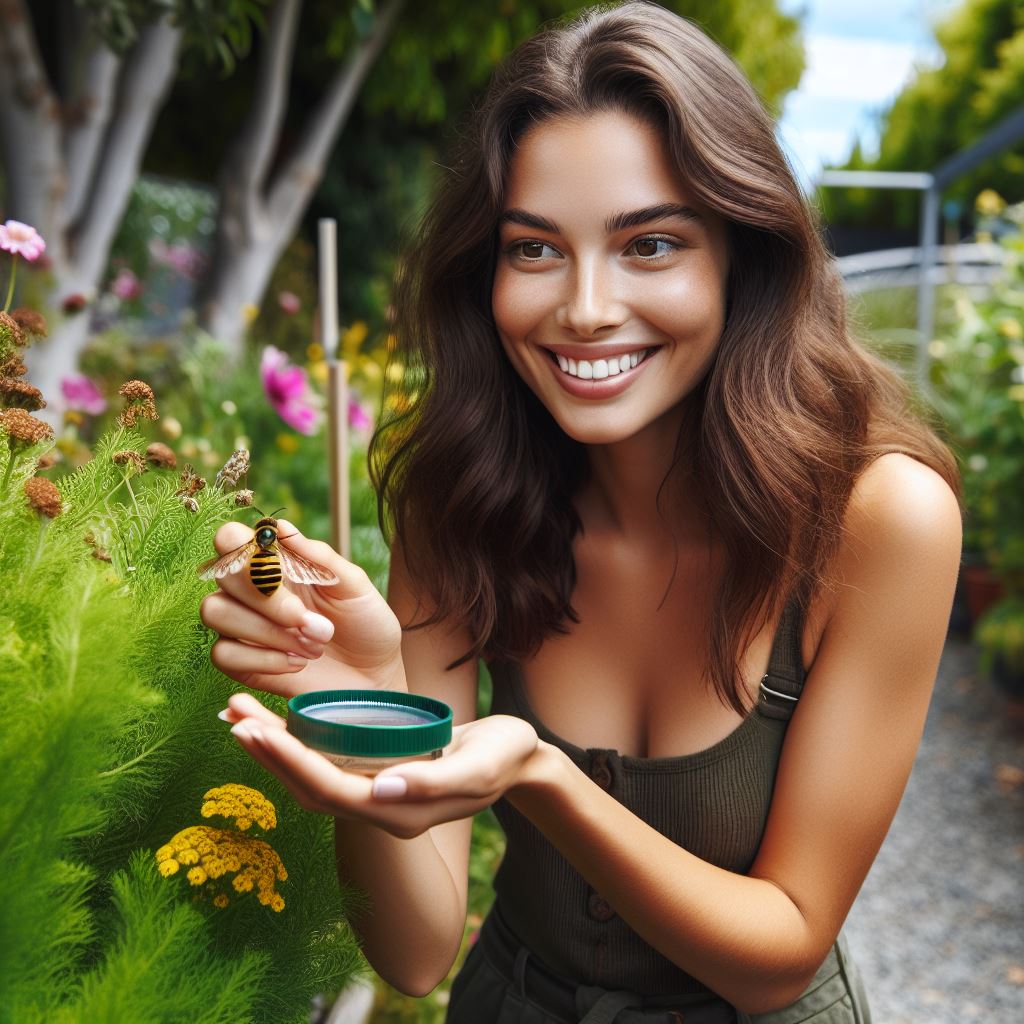Introduction
Farmers are increasingly turning to essential oils as a natural method to combat pests.
These oils, derived from plants, offer numerous benefits, including effectiveness and eco-friendliness.
As conventional pesticides face scrutiny for their harmful effects on the environment and human health, essential oils present a promising alternative.
With their rising popularity, it is essential to explore their potential for pest control in farming.
Essential oils have long been used for their aromatic and therapeutic properties, but their use as insecticides has gained traction.
Farmers are recognizing their ability to repel and control pests, such as insects, mites, and nematodes, without relying on toxic chemicals.
This natural approach safeguards both crops and the surrounding ecosystem, preserving biodiversity and promoting sustainable farming practices.
Benefits and increasing popularity of using essential oils as a natural pest control method
The benefits of using essential oils as pest control agents extend beyond their environmental impact.
These oils are extracted from various plant parts, containing active compounds that target specific pests.
This targeted approach ensures minimal harm to beneficial insects, reducing the risk of disrupting the ecological balance.
Moreover, essential oils leave no harmful residues on crops, making them safe for consumption and attractive to consumers seeking chemical-free alternatives.
As public awareness of the harmful effects of synthetic pesticides grows, the demand for organic produce and sustainable farming practices is on the rise.
Essential oils offer a solution that aligns with these consumer preferences and regulatory standards for safer agricultural practices.
By incorporating essential oils into pest management strategies, farmers can meet market demands, enhance crop yields, and contribute to a healthier and more sustainable farming industry.
In the upcoming sections, we will delve into specific essential oils and their efficacy against common pests, explore application methods, and discuss considerations for implementing this natural pest control method.
Stay tuned to discover how essential oils can revolutionize pest management in farming, benefiting farmers, consumers, and the environment alike.
Understanding Essential Oils
- Essential oils are plant extracts that contain the natural fragrance and properties of the plant.
- They are extracted through methods like steam distillation, cold pressing, or solvent extraction.
Types of Essential Oils Commonly Used in Pest Control
- Lavender oil: Effective against mosquitoes, flies, and moths.
- Peppermint oil: Repels ants, spiders, mice, and mosquitoes.
- Eucalyptus oil: Keeps away fleas, ticks, and mosquitoes.
- Tea tree oil: Works against ants, cockroaches, and bed bugs.
- Citronella oil: Acts as a natural mosquito repellent.
- Cedarwood oil: Deters insects like moths, fleas, and ticks.
The Importance of Using High-Quality, Organic Essential Oils
- High-quality essential oils are more potent and effective in repelling pests.
- Organic oils do not contain any harmful chemicals or pesticides.
- They are safe to use around pets, children, and for those with allergies.
- Organic oils are environmentally friendly and do not harm beneficial insects.
- Using lower quality or synthetic oils may not provide desired results and can be harmful.
How Essential Oils Can Be Used Against Pests
There are several ways to use essential oils for pest control:
- Spray: Dilute essential oils with water and spray in areas prone to pests.
- Diffuser: Use an essential oil diffuser to spread the fragrance and repel pests indoors.
- Cotton Balls: Soak cotton balls in essential oil and place them in pest-prone areas.
- Direct Application: Apply a few drops of essential oil directly on skin or clothing to repel insects.
- Homemade Repellents: Mix essential oils with other natural ingredients to create DIY pest repellents.
Precautions When Using Essential Oils
While essential oils are natural, it’s important to take some precautions:
- Avoid direct contact with eyes, mouth, or open wounds.
- Always dilute essential oils before applying them to the skin to prevent irritation.
- Perform a patch test on a small area of the skin before using essential oils topically.
- Store essential oils in dark glass bottles away from direct sunlight and heat.
- Keep essential oils out of reach of children and pets.
Essential oils offer a natural and effective solution for pest control.
Understanding the different types of oils and their extraction process can guide us in choosing the right oils.
Opting for high-quality, organic oils ensures more potent results without harming the environment or our health.
Safely using essential oils through spraying, diffusion, or direct application can help us keep pests away without resorting to harmful chemicals.
Read: Urban Chicken Coops: Fresh Eggs Daily
Common pests in farming
- Farmers often encounter pests such as aphids, caterpillars, slugs, snails, and rodents.
- Aphids can infest plants and cause stunted growth, yellowing leaves, and the spread of diseases.
- Caterpillars devour leaves, flowers, and fruits, leading to reduced crop yields and financial losses.
- Slugs and snails feed on young plants, causing holes and destruction to the foliage and fruits.
- Rodents like rats and mice can infest storage areas, contaminating crops and spreading diseases.
Potential damages caused by pests to crops and livestock
- Pests can cause significant damages to both crops and livestock, affecting the farmer’s income.
- Infested crops often show reduced productivity, lower quality, and increased vulnerability to diseases.
- For livestock, pests like flies can cause stress, skin irritations, and reduced milk or meat production.
- Parasites such as ticks and mites can transmit diseases to livestock, affecting their overall health.
- Pests can also lead to post-harvest losses due to crop contamination and storage damage.
Importance of adopting eco-friendly pest control methods
- Eco-friendly pest control methods minimize the negative impact on the environment and human health.
- Using essential oils against pests is an excellent eco-friendly alternative to chemical pesticides.
- Essential oils like neem, peppermint, and rosemary have natural insect-repelling properties.
- They can disrupt pests’ reproductive cycles, repel them, and even act as natural insecticides.
- By using essential oils, farmers can reduce their reliance on harmful chemical pesticides.
Benefits of using essential oils against pests in farming
- Essential oils are natural and do not leave toxic residues on crops, making them safe for consumption.
- They offer a sustainable and cost-effective pest control solution for farmers.
- Unlike chemical pesticides, essential oils do not harm beneficial insects like bees and butterflies.
- Using essential oils creates a healthier environment for farmers, livestock, and surrounding ecosystems.
- Farmers can also use essential oils in combination with other organic pest control methods for better results.
Steps to effectively use essential oils against pests in farming
- Identify the specific pests and their infestation levels in the farm.
- Research and select the appropriate essential oils for targeting those pests.
- Dilute the essential oils according to recommended ratios and mix with water or carrier oils.
- Apply the diluted essential oils to the infested crops or areas using a sprayer or other appropriate methods.
- Reapply the essential oils as needed, considering their effectiveness and the pests’ life cycle.
In fact, pests are a common challenge for farmers, causing substantial damages to crops and livestock.
However, by adopting eco-friendly pest control methods like using essential oils, farmers can effectively manage pest infestations while minimizing harm to the environment, beneficial insects, and overall health.
Using essential oils provides a natural, safe, and sustainable approach to controlling pests in farming.
Read: DIY Urban Greenhouse: Step-by-Step

Essential oils for pest control
Essential oils have proven to be effective in pest control, with specific oils known for their pest-repelling properties.
There are various ways to use essential oils in pest control, including dilution, direct application, or creating sprays.
Here is a list of essential oils and the pests they are effective against:
- Lavender oil: repels ants, fleas, and moths
- Peppermint oil: deters spiders, ants, and mice
- Eucalyptus oil: wards off mosquitoes, flies, and ticks
- Citronella oil: repels mosquitoes and other flying insects
- Tea tree oil: effective against bed bugs, ants, and spiders
When using essential oils, it is important to dilute them properly to avoid skin irritation or allergic reactions.
Transform Your Agribusiness
Unlock your farm's potential with expert advice tailored to your needs. Get actionable steps that drive real results.
Get StartedDirect application of essential oils can be done by applying a small amount to cotton balls and placing them in problem areas.
Essential oil sprays can be made by combining a few drops of the chosen oil with water in a spray bottle.
To keep pests away from indoor plants, a drop of essential oil can be added to their watering can.
Creating a barrier by applying essential oils around doorways, windows, and cracks can help prevent pests from entering the house.
Regularly cleaning surfaces with a mixture of essential oil and water can help repel pests and keep the house clean.
Adding essential oils to cleaning solutions can also help eliminate any pests hiding in the house.
Essential oils can also be used in outdoor areas to repel pests during outdoor activities or while gardening.
Creating a mixture of essential oil and carrier oil and applying it to the skin can help protect against mosquito bites.
In general, essential oils offer a natural and effective solution for pest control, and the specific oils mentioned above can be used to repel various pests.
By using them in different ways, such as dilution, direct application, or in sprays, it is possible to keep pests at bay without using harmful chemicals.
Read: Hydroponics: Gardening Without Soil
Benefits of Using Essential Oils
Advantages of Using Essential Oils Compared to Traditional Chemical Pesticides
Essential oils have gained popularity as an effective and natural approach to pest control.
Unlike traditional chemical pesticides, essential oils provide several benefits:
- Non-Toxic Nature: Essential oils are non-toxic, making them safe for plants, animals, and humans. Unlike chemical pesticides, they do not pose health risks or leave harmful residues.
- Environmentally Friendly: Essential oils are derived from plants, making them a sustainable and eco-friendly option for pest control. The production and use of these oils have lower environmental impact compared to chemical pesticides.
- Pleasant Aroma: Essential oils emit pleasant smells, unlike the strong and unpleasant odors associated with chemical pesticides. This makes them ideal for indoor pest control without causing discomfort to inhabitants.
- Multi-Purpose Use: Essential oils have multiple uses beyond pest control. They can be used for aromatherapy, relaxation, and improving overall well-being. This versatility adds value to using essential oils over traditional pesticides.
- Effective Against a Wide Range of Pests: Essential oils, when used correctly, can effectively repel or eliminate a variety of pests such as mosquitoes, ants, flies, and spiders. They offer a natural and efficient solution to pest problems.
- Cost-Effective: Essential oils are typically more affordable than chemical pesticides in the long run. A little goes a long way, as only small amounts of essential oils are needed to achieve desired results.
The Non-Toxic Nature of Essential Oils
One of the key advantages of using essential oils for pest control is their non-toxic nature.
Unlike chemical pesticides, essential oils do not harm plants, animals, or humans.
This non-toxicity makes them a safe alternative:
- Safe for Plants: Essential oils do not damage plants or hinder their growth. In fact, some essential oils like neem oil can even promote plant health.
- Safe for Animals: Chemical pesticides can be harmful to pets and beneficial insects. Essential oils, on the other hand, have minimal impact on animals and insects when used at appropriate concentrations.
- Safe for Humans: Essential oils are safe for direct contact with human skin, reducing the risk of skin irritations or allergic reactions. People can apply essential oil-based insect repellents without worry.
Sustainable and environmentally-friendly aspects of essential oil pest control
Emphasizing the Sustainable and Environmentally-Friendly Aspects of Essential Oil Pest Control
Choosing essential oils for pest control also promotes sustainability and environmental friendliness. Here are some reasons why:
- Renewable Resource: Essential oils are derived from plants, which can be harvested and replanted, ensuring a continuous supply without depleting natural resources.
- Reduced Environmental Impact: Unlike chemical pesticides that can contaminate soil, water, and air, essential oils break down naturally without leaving harmful residues or polluting the environment.
- Biodegradable: Essential oils are biodegradable, meaning they can decompose naturally without causing long-term harm to ecosystems.
- Beneficial to Bees and Other Pollinators: Many essential oils such as lavender and peppermint are attractive to bees and other pollinators, providing them with a food source while effectively repelling pests.
In review, essential oils offer numerous benefits for pest control compared to traditional chemical pesticides.
Their non-toxic nature, sustainability, and effectiveness against pests make them a
safe and eco-friendly choice for pest management.
Read: Window Box Farming: Herbs and Flowers
Best practices for using essential oils against pests
Using essential oils can be an effective and natural way to repel pests in your home or garden.
However, it is important to follow certain guidelines to ensure proper application and dosage for desired results.
Regular monitoring and reapplication are also necessary to maintain an effective barrier against pests.
In addition, there are potential risks and precautions to be aware of when using essential oils.
Guidelines for Proper Application and Dosage
- Choose high-quality essential oils that are known for their pest-repellent properties.
- Dilute essential oils with a carrier oil, such as coconut oil or almond oil, before application.
- Apply the diluted essential oil mixture to the desired areas using a spray bottle or cotton balls.
- Pay special attention to areas where pests are commonly found, such as entry points and potential hiding spots.
- Reapply the essential oil mixture every few days or as needed, especially after rain or heavy watering.
- Experiment with different essential oil blends and scents to find the most effective combination for your specific pest problem.
- Keep in mind that some essential oils may be toxic to certain pests but harmless to humans and pets.
Importance of Regular Monitoring and Reapplication
Pests can quickly develop resistance to essential oils, so regular monitoring and reapplication are crucial for long-term effectiveness.
Here are some important points to keep in mind:
- Monitor the treated areas regularly for any signs of pest activity or damage.
- Inspect plants, windows, doors, and other potential entry points for any cracks, gaps, or holes.
- Reapply the essential oil mixture whenever pest activity is observed or suspected.
- Consider using a combination of essential oils to target various pests and prevent resistance.
- Be patient and persistent, as it may take some time for the essential oils to repel pests completely.
Potential Risks and Precautions
While essential oils are generally safe when used properly, there are some risks and precautions to be aware of:
- Some essential oils may cause skin irritation or allergic reactions in certain individuals. Perform a patch test before widespread application.
- Avoid direct contact with eyes, nose, and mouth when handling essential oils.
- Keep essential oils out of reach of children and pets.
- Do not use essential oils on or near food preparation surfaces.
- Consult a professional or do thorough research before using essential oils around pregnant women, infants, or individuals with certain medical conditions.
- Store essential oils in a cool, dry place away from sunlight to maintain their potency.
By following these best practices, you can effectively use essential oils to combat pests in your home or garden, while minimizing risks and maximizing results.
Case Studies or Success Stories
- Farmer John successfully controlled aphids on his crops using essential oils, resulting in improved yields.
- After applying essential oils, Farmer Sarah noticed a significant decrease in caterpillar damage on her vegetables.
- Essential oil sprays helped Farmer Mark combat spider mites, saving his entire tomato crop.
- A farmer in California used lavender oil to deter rodents, effectively protecting his citrus grove.
Positive Outcomes and Improved Yields
Using essential oils against pests has demonstrated numerous positive outcomes and improved yields for farmers.
Showcase Your Farming Business
Publish your professional farming services profile on our blog for a one-time fee of $200 and reach a dedicated audience of farmers and agribusiness owners.
Publish Your ProfileBy implementing essential oil pest management strategies, farmers have seen a reduction in crop losses caused by destructive insects.
For instance, lavender oil has been proven effective in repelling pests such as aphids, caterpillars, and spider mites.
Farmers who have applied lavender oil to their crops have noticed a decrease in pest damage and an increase in overall crop productivity.
Another essential oil that has shown promising results is neem oil.
It has been widely used to combat pests like whiteflies, thrips, and mealybugs.
Farmers applying neem oil on their plants have reported reduced infestations, leading to healthier and more abundant harvests.
Additionally, peppermint oil has been successful in repelling rodents.
Farmers who have integrated peppermint oil into their pest management practices have prevented rodent damage to their crops, saving them from substantial financial losses.
Reduced Crop Losses Achieved through Essential Oil Pest Management
One farmer, Anne, had been struggling with aphid infestations on her apple trees for years.
Traditional pest control methods were not providing satisfactory results.
After researching alternative solutions, Anne decided to try using essential oils.
She mixed a solution of peppermint and rosemary oil and sprayed it on her apple trees regularly.
The results were astounding. The aphid population decreased significantly, allowing the apple trees to flourish.
Anne saw a significant reduction in crop losses and an increase in apple production.
Another farmer, Mike, faced a persistent caterpillar problem in his vegetable garden.
Frustrated with ineffective chemical pesticides, he turned to essential oils as a last resort.
Mike concocted a mixture of thyme and eucalyptus oil and sprayed it on his vegetables.
To his delight, the caterpillar infestation started to decline rapidly, and his vegetables showed signs of recovery.
These stories demonstrate the efficacy of essential oils in pest management.
Real-life examples like these provide evidence of the positive impact essential oils can have on crop yields and reduced crop losses.
As farmers continue to embrace essential oil pest management practices, more success stories are being documented.
The use of essential oils offers a natural, environmentally friendly, and effective approach to combating pests on farms.
It is worth considering incorporating essential oils into pest management strategies to achieve improved outcomes, increased yields, and reduced crop losses.
Conclusion
Using essential oils against pests has proven to be an effective and sustainable pest control method.
By summarizing the key points discussed in this blog post, we have highlighted the advantages of essential oils in combating pests naturally.
Essential oils not only repel pests but also disrupt their reproductive processes, making them a formidable solution.
Additionally, essential oils are safe for the environment and do not harm beneficial insects or contaminate crops.
Considering these benefits, it is highly recommended that farmers and gardeners incorporate essential oils into their pest management practices.
By doing so, they can protect their crops while avoiding the use of harmful chemicals.
Embracing natural methods like essential oils not only ensures healthier produce but also promotes a sustainable and eco-friendly approach to farming.
So, give essential oils a try and experience the power of nature in controlling pests without compromising on quality or safety.




